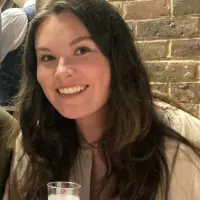Amy was diagnosed with coeliac disease in 2014 after a stressful final year at...

Real Stories
Beth's Story
Diagnosed in 2001 aged four, Beth tells us her gluten free story
When did you get diagnosed with coeliac disease?
I was diagnosed in 2001 aged four, and until then I was always very exhausted, unable to take part in activities or playtime, and if I did, I would often have to sit down a lot. I also had a large tummy disproportionate to my body and was very anaemic. I went through a lot of different testing. They investigated blood conditions and all sorts of things until, eventually, a locum paediatrician suggested I be tested for coeliac. It probably took about a year and a bit from when doctors started looking into it to when I finally had my biopsy and endoscopy.
Coeliac disease is often hereditary, so after it was confirmed that I had coeliac, they then tested my family for it, and it turned out my mum was also diagnosed, having had unexplained anaemia for years. A few years after that, my nana was then diagnosed (on my mum's side), and then a few years after that, my grandma was diagnosed (on my dad's side). So, I guess you could say it was unlikely that I could have avoided getting it. My sister, however, did manage to avoid it, but she gets a blood test every few years to check she hasn't developed it. It's a whole family affair!
How did you feel about the diagnosis?
I don't honestly remember (I was four!) However, from what I've been told, my parents were scared and confused and somewhat overwhelmed. They were very much helped by receiving a lot of info for newly diagnosed people from both Coeliac UK and Juvela. We received Juvela' starter' boxes of products when you're newly diagnosed. We joined Coeliac UK, and they put us in touch with the family of another recently diagnosed child in our village, which helped.
I'm incredibly grateful that I was diagnosed so young. My nana was diagnosed too late in life, and by that point she had developed osteoporosis, which is, unfortunately, a result of untreated coeliac that was tragically fatal. I will be forever thankful that my symptoms were investigated, so I am able to live a 'normal' healthy life.
What was your relationship with food like before you were diagnosed with coeliac disease?
I was too young to remember! I've always been a foodie though, and my diagnosis provided me with the opportunity through the years to test my cooking skills and try new things.
Have you ever felt like you have missed out because of coeliac disease?
I'm lucky that my mum is so amazing. Even before she was diagnosed, she immediately got to work creating a coeliac safe kitchen environment and ensuring that I was never left out at meals. The whole family eat gluten free meals at home, and it's become a nice 'challenge' to find new gluten free products in shops and new gluten free options in restaurants. In some respects, being diagnosed so young means, I don't know what I'm missing out on, whereas my mum will often say how much she misses French baguettes and Maltesers. I can't miss what I don't know..!
Being a coeliac child is tough though. Bringing along your own food to parties, never getting to eat birthday cake, and having to explain your coeliac to adults when you don't fully understand it yourself was a difficult aspect of being a gluten free child.
There are still times when I miss out now. I suffer from severe physical symptoms whenever I'm glutened, and this has caused me to develop food anxiety. Eating out, even after triple-checking a place beforehand, is a challenge for me. I'm learning to manage my food anxiety so I can eat what I want in restaurants and not just what is the plainest.
Did you notice a difference in mood and health after sticking to your gluten-free diet?
My parents would definitely say my health improved dramatically and visibly. I stopped being exhausted all the time and my body became more proportioned. I was also very anaemic before my diagnosis, which became a lot better afterwards.
I'd say to anyone who's not strict, even if you don't have any physical symptoms you will still be doing internal, long-term damage to your body, so it's important to stick to the gluten free diet. Health is whole-person and not just a physical manifestation.
What does eating "well" mean to you?
Trying new things and getting excited about food is how I "eat well". I love the excitement of finding a new gluten free restaurant or bakery. I also love to be creative in the kitchen, which I think is a hugely important part of eating well because you're being adventurous and having a variety of things. This is why I set up my hobby blog, Caking it Gluten Free, because it's so important to be adventurous regardless of your food restrictions. Your coeliac diagnosis should never hold you back – see it as an opportunity.
What's your favourite Juvela product and what do you make with it?
My favourite product is definitely the Juvela White Mix. When I was diagnosed the first gluten free Christmas cake I made with my mum was with the White Mix, so I have happy memories associated with it.
What advice would you give to your younger self or to a newly diagnosed coeliac about what you now know about coeliac disease and gluten-free foods?
Don't ever be embarrassed! Having to explain your autoimmune condition to someone else says everything about their lack of knowledge and nothing about you. I spent so many occasions throughout my childhood and teenage years trying to play it down and act like it wasn't a big deal, but in fact I had every right to make a big deal out of it.
Also, look at it as an opportunity. There's so many fantastic gluten free foods now, so take the time to explore them and get to know what you like and don't like. Make it a challenge to go to new gluten free restaurants and get yourself excited to find new things.
And finally, what's your top tip for staying positive?
If I ever feel sad about being a coeliac (which luckily is rare), then getting into the kitchen and baking something delicious will always improve my mood! Cake is my weakness and gluten free cake can be just as delicious as glutenous cake – hence why I started up Caking it Gluten Free to share these recipes with others.
Another great tip for staying positive is to plan your trips to ensure you don't end up feeling left out. I never go on holiday without first researching gluten free options. It keeps it fun and exciting, instead of a chore.
Keep in touch with Beth here

